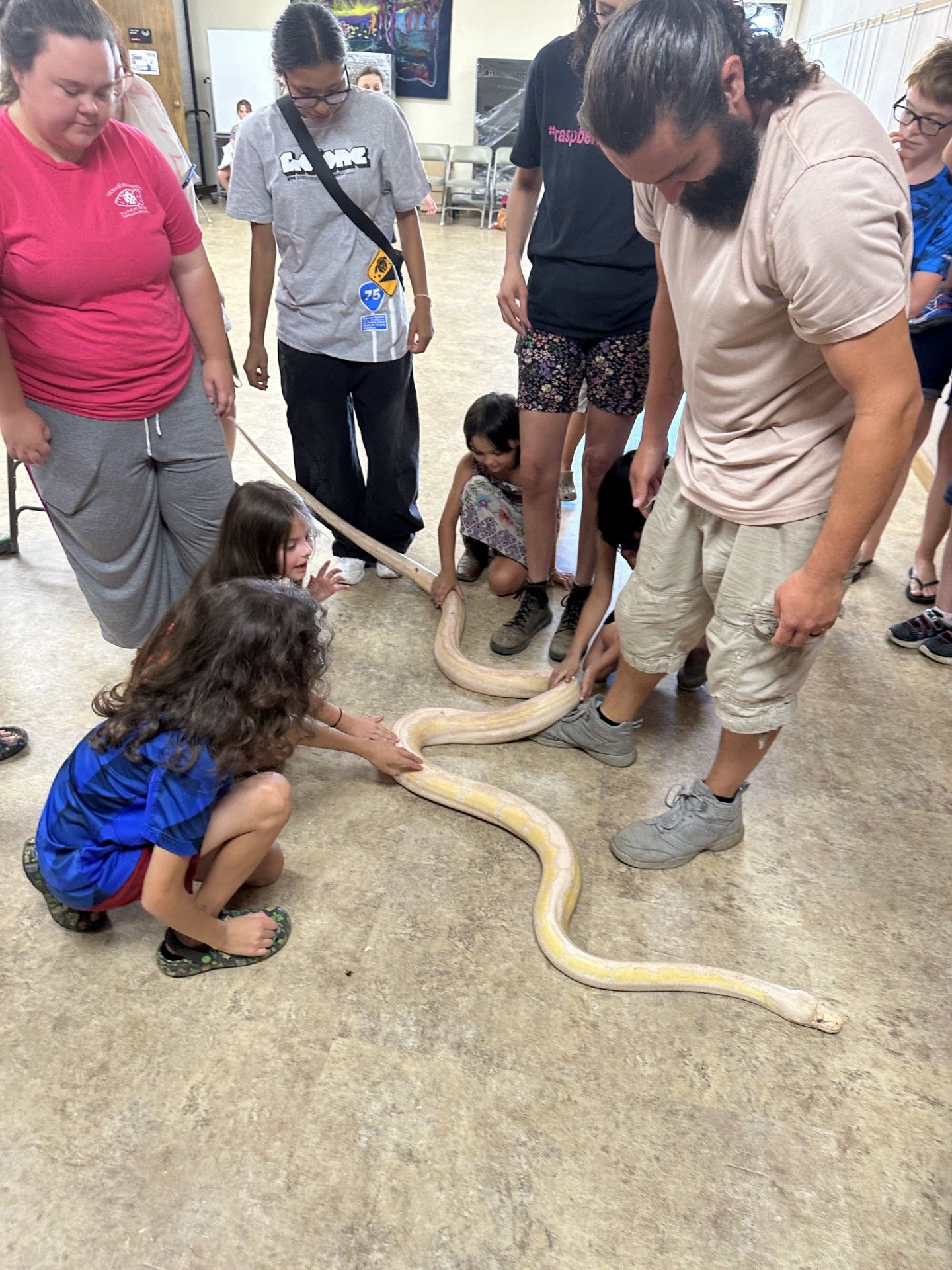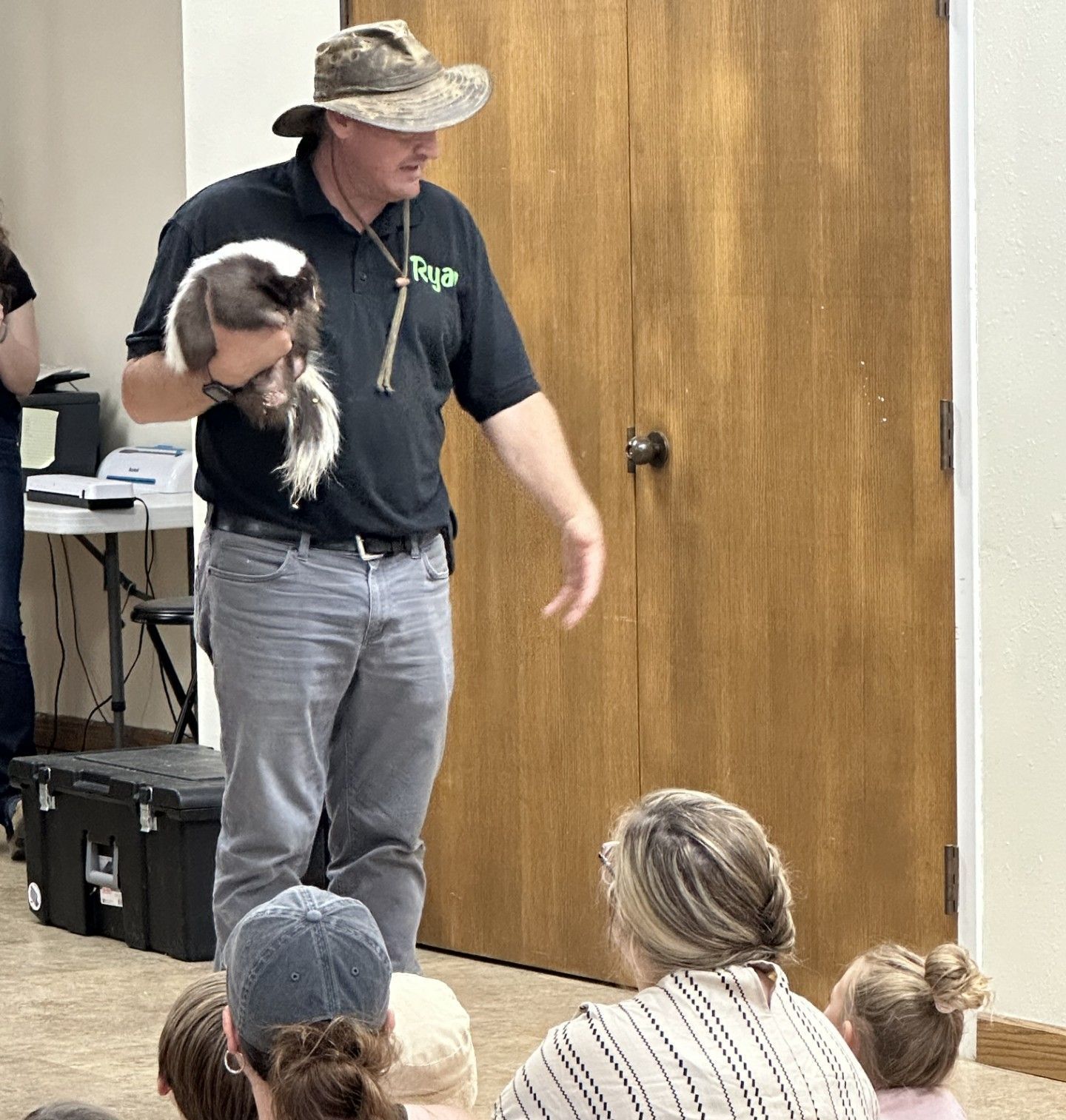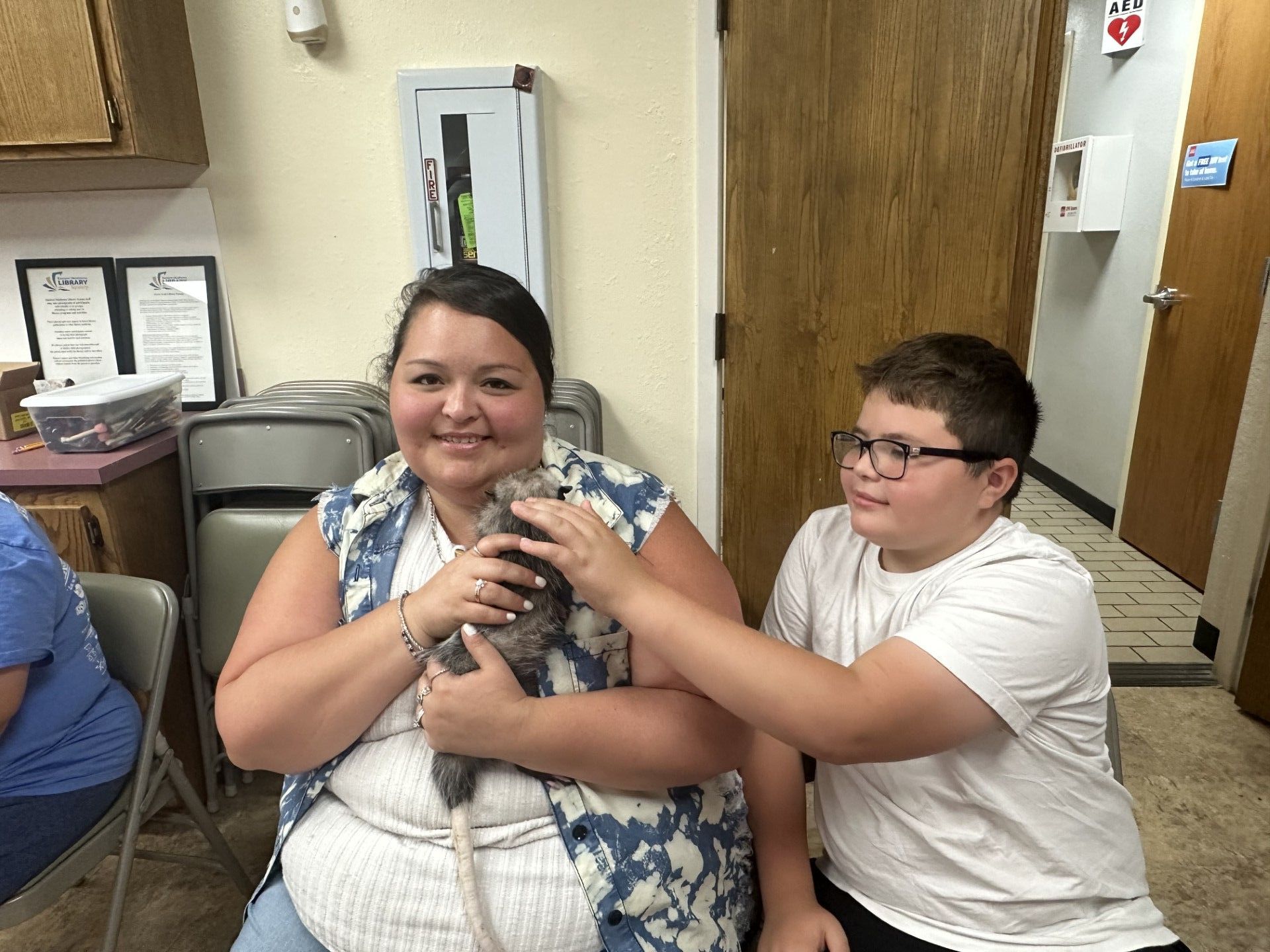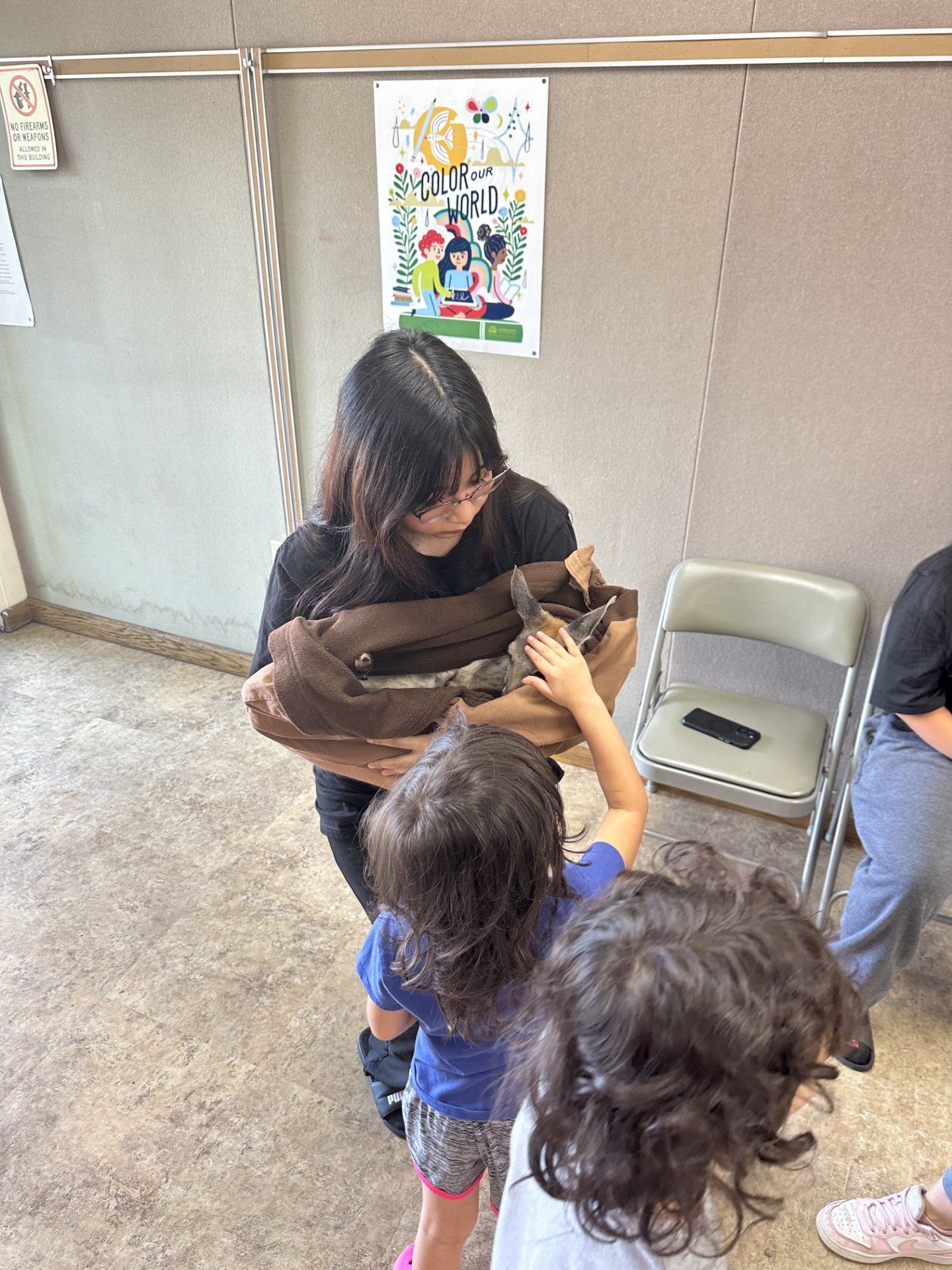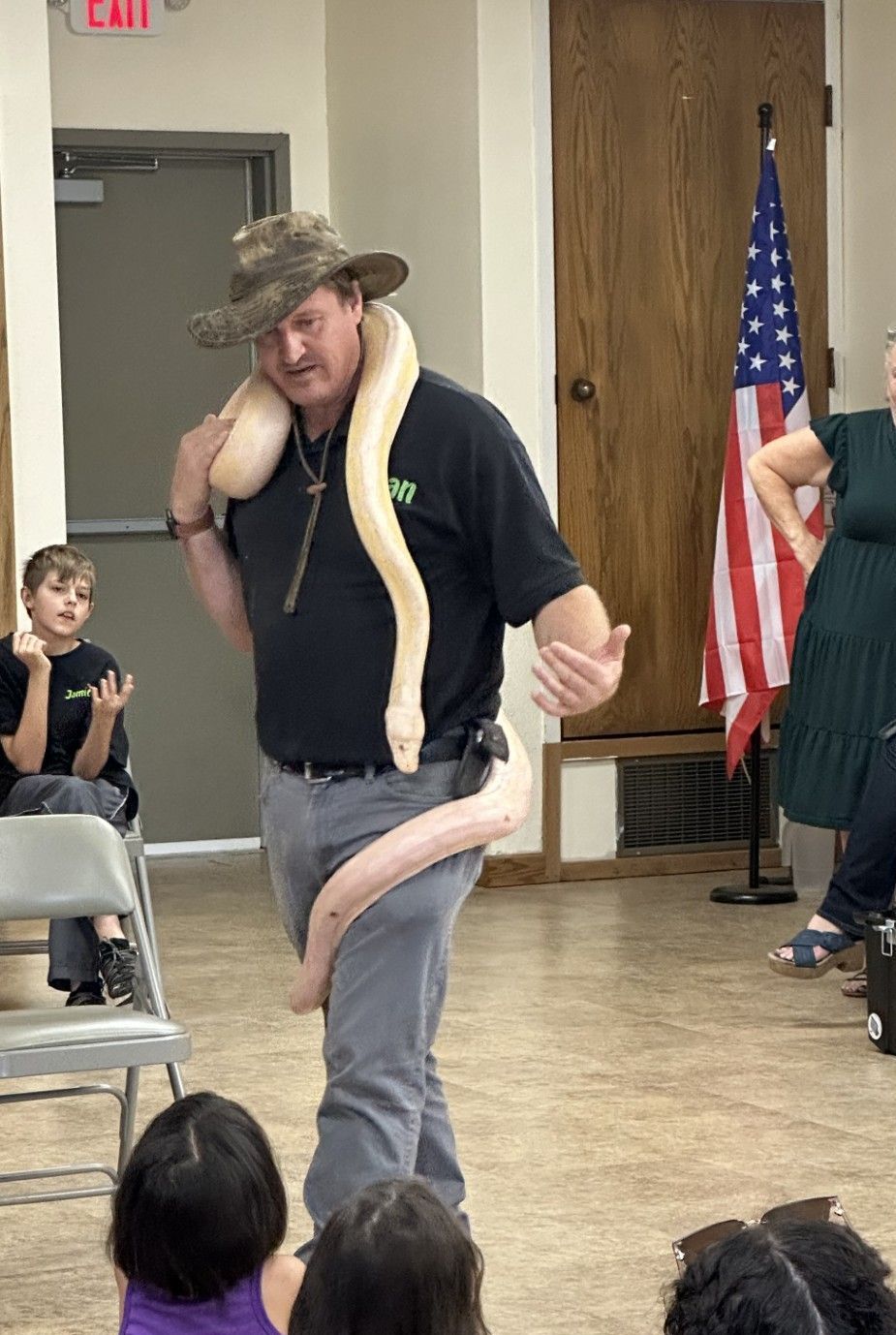Pawsitively
by Renee Fite
City of Stilwell Director of Public Relations and Media
Nothing to do summer blues? The Stilwell Public Library has programs week days and is open until 1 on Saturdays, from arts and crafts to special events. On Tuesday, July 15, Pawsitively Wild owner Ryan Krueger shared information about native and non-native animals, including a baby kangaroo or Joey and a chocolate skunk, with a large,
enthusiastic audience.
Educating visitors is important to Krueger, owner of Pawsitively Wild Animal Encounters and Education Center in Atoka, Oklahoma, a clean, safe space to enjoy a hands-on animal experience. They have about 300 animals. “We love animals and want to spread that love, especially to skunks and possums, they’re amazing,” Krueger said.
Being good pet parents is knowing how much time, resources and space are needed to take care of an animal.
“Huskies and Malamutes are not bred for Oklahoma, because they have thick fur. When I’m 70 and retired, I’m getting a Bassett Hound with short legs and a belly, like I’ll be,” said Krueger.
Elephants might not be a good pet. “Ask yourself before you get a pet what is needed to take care of it. There’s no place to put an elephant at your house ad you don’t know what to feed it,” Krueger said.
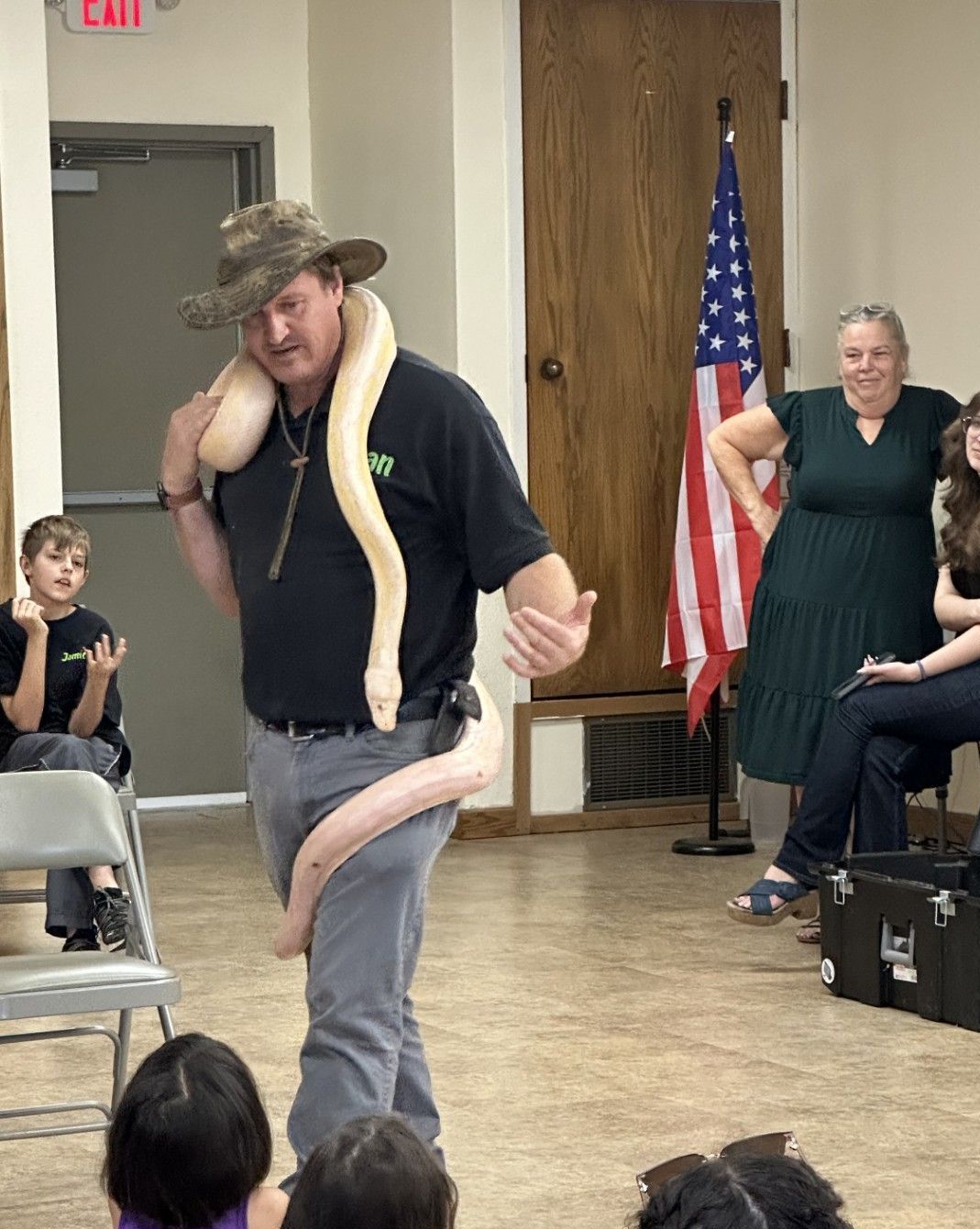
Snakes are venomous, not poisonous, because the venom attacks a
person or animal and poison does not, Ryan Krueger told the audience at the Pawsitively Show at the Stilwell Library, holding a Burmese Python.
Photo: Renee fite
How many here have ever heard a rumor and believed it? “Parents you know what I mean. My next two animals you might have heard of or
seen and had a misconception about them,” said Krueger.
“Of all the 300 animals I have, only one that can carry rabies, skunks. He’s been vaccinated. It’s a myth that they’re mean. What adult would like to hold him?” he said, handing the skunk to someone in the audience.
Another fact shared about possums was how to rescue babies.
“We’ve learned that when a mother possum dies, the babies have to be removed with 30 minutes of her death because her milks become poisonous,” he said. One negative about possums is they carry a virus that, if they poop in horse feed, can be bad for horses, he said.
Native animals are protected. It’s a $1,000 a day fine to have and raise a native animal without a license. The Fish and Wildlife Department is where a license is obtained.
“A sloth is illegal in 33 states, and hedge hogs are illegal I five states,” he said. Kids and adults were interactive and happy to chat with Mr. Krueger. Each time he talked about an animal, he asked for a volunteer to hold it. He told everyone that animals need to be held, but not too much, so instead of passing the animals around he lets one person cuddle it, and others can pet it.
Meet Sammy Skunk. “Skunks come in three flavors, black and white, chocolate and white like Sammy here and the rare while albino skunk,” he said, holding the animal close. His stinker has been removed.
A possum was up next. “A possum is the only marsupial found in North America. A marsupial is a mammal that has a pouch to carry its babies in,” he said. “A possum is not a menace, they don’t dig holes and don’t carry disease. They will eat the cat food on your porch.”
Best of all, a possum eats up to 10,000 ticks a year.
“The animals are cool. I like the kangaroo the most,” Kingston said after the show. Drake Ross had a bearded dragon perched on his shoulder.
“It’s chill and cool to the touch and spiky. This is a good learning experience,” said Ross.
“If you charge people to see your animals you need a federal license. A native animal is one you find I your state, like skunks, possums, squirrels, bunny rabbits, coyotes, bear, bobcats, armadillos and white tailed deer,” he said. He has a license to show, raise and breed native animals, but some animals are limited to where they can be raised.
Holding a rabbit, Janice Ernst, 8, said, “I love the fur. This is a cool show.”
Next Krueger asked who liked snakes? And a volunteer, Audra Cochran, went up to hold the bag which was actually holding a joey, or baby kangaroo. This is a Red Kangaroo, a boxing kangaroo.
“A baby kangaroo is the size of a quarter and stays in the mom’s pouch, so we don’t always know when they’re born. About six months old they’ll poke their bald head out of the pouch,” he said.
“I’ll keep him about a year before he goes to a zoo,” said Krueger. Cochran said he was, “pretty cute.”
This is a sweet little Fennic Fox, ‘a chihuahua of fox breeds,’ Krueger said.
Even being held everyday a fox doesn’t get that friendly. They do eat
mice.
Last but not least, was a Burmese Python, in fact the largest of the animals shared with the audience.
It’s native to the South American Rainforest. “If you were walking along in the rainforest would you have to worry about stepping on one?” he asked.
Four years ago Krueger moved his family from the Pacific Northwest, Washington to Atoka, Oklahoma by throwing a dart at a map. “I love watching the adults, they get a lot out of these shows, more than the kids at times,” he said.
They don’t make good pets because they get big, are strong and need several acres of fencing.
“It’s pretty cool get to experience this and see all the animals,” said Cochran. A small fox was held close to Krueger.
Their ears serve two purposes. “They are nocturnal, so their ears are to hear better and they have blood vessels which help cool their blood and regulate their temperatures,” he said. “Nocturnal means they sleep in the day and come out at night.”
“People often ask if it bites. If it has a mouth it bites. If the bite is venomous, it eats you,” said Krueger.
No, several in the audience said, “they live in trees.” Devyn Ross volunteered to hold the snake. “I love snakes, I like the way it cooled my body down and it felt like a backpack,” Ross said.
Marty Swain brought four great grandkids from Arkansas.
“We really enjoyed it,” said Swain. Library Manager Rachael Horney said animal shows are always popular. “Adults and kids like them. It’s the first time we’ve used Pawsitively and I think it went great,” she said.

